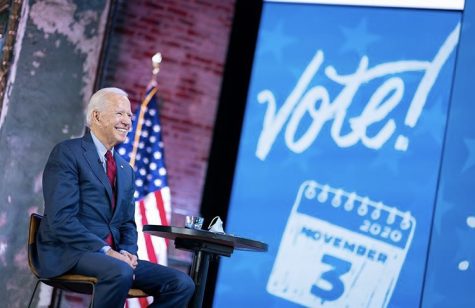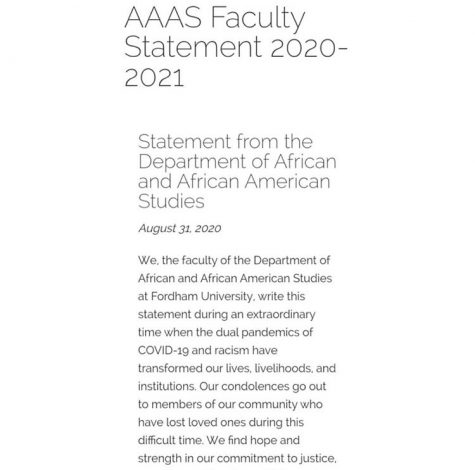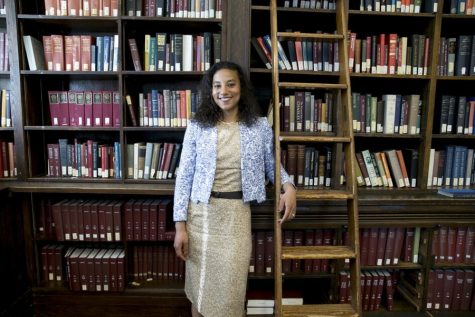Administration Releases Anti-Racism Action Plan
July 16, 2020
Rev. Joseph M. McShane, S.J., president of the university, sent an email to the Fordham community on June 29 addressing the demand for Fordham’s response to racism and injustice at the university. This follows multiple campaigns on social media and other platforms bringing attention to cases of racism at Fordham and demanding change.
“We have read the many emails, petitions, and Instagram posts that have come from the University community,” read the email. “We have all been moved and dismayed by these statements and testimonials, and deeply saddened by the trauma that prompted them. Therefore, it is clear that the national awakening has come to Fordham. To be sure, we have in the past made strides in our efforts to create a more diverse, inclusive, and affirming community. But this moment has made it clear that we can and must do more.”
The email outlined a plan for action against racism on Fordham’s campuses and within the communities associated with the university. The plan listed goals for the university and steps they would take to achieve these goals. A few of the strategies include recruiting more students and faculty who are people of color and creating curricular and cocurricular programs that confront and educate about racism.
The plan said the new McGinley Center would include a multicultural center, and a similar space would be established at Lincoln Center. It also listed specific plans to work more closely with the Office of the Chief Diversity Officer and the Office of Multicultural Affairs.
A list of action items for Fordham to become more engaged with the Bronx community was included. These plans include inviting more Bronx students to come to campus as well as supporting local businesses and events.
“The divisions and departments responsible for the various initiatives outlined above will develop implementation plans,” read the email. “The Board of Trustees and the cabinet will be deeply involved in the process, reviewing those plans and follow-up reports with an eye to effectiveness and sustainability.”
The deans of Fordham’s colleges also sent emails outlining plans to enforce these changes in their individual colleges, such as more training about racism for faculty and administrators.
ASILI, the Black Student Alliance at Rose Hill, released a list of demands from the Fordham administration on their Instagram account on June 22. After McShane sent his email, ASILI responded to the plan.
“Firstly, thank you to everyone who stood in solidarity with us and flooded Fordham’s inboxes,” ASILI said on their Instagram account. “We saw some victories in Fordham University’s action plan, but there is still more work to be done. Change is possible, let’s keep it going.”
The updated list acknowledged successful responses, including creating a physical multicultural center for students of color on campus, working to create an immediately implemented employee bias training program that addresses anti-Blackness and making a written commitment to combat anti-Blackness.
The email was vague about a few of their demands such as hiring more Black professors who work outside of the African American studies department and making a commitment to combating anti-Blackness through course requirements.
There were still six demands that Fordham’s email and action plan failed to address. These demands include appointing more Black and queer administrators, ensuring that students will not face university punishment if they are arrested while protesting off-campus and acknowledging and unpacking Fordham’s ties to the police.
The administration also did not address the demands to cut ties with Aramark, to remove or restructure the University’s demonstration policy and to prioritize Counseling and Psychological services (CPS) specifically to ensure there are employees who are specially trained to handle the needs of marginalized students on campus.
The Instagram account Black at Fordham (@BlackatFordham), an account that shares the experiences and stories of Black students at Fordham, also posted a response to McShane’s email on their Instagram story. Their response acknowledged that these changes would not have been possible without students, alumni and faculty sharing their stories.
“We are not done. BlackatFordham is fully committed to sharing the stories of Black/POC students and the experiences people have had and witnessed on Fordham’s campus at the hands of Fordham students, Fordham faculty, and Public Safety until we run out. Fordham’s lack of mention about public safety or the deans and professors (and a certain VP) that have been named doesn’t sit right with us therefore we encourage you to continue to speak out,” read the post.
The account said they stand by ASILI’s demands and will continue to fight for those changes to be addressed and implemented.
“Again, this is not a moment, it’s a movement,” read the post. “We’ve seen some change, but let’s keep it going. We are not done sharing stories and we hope you are not done listening.”










If you want a picture to show with your comment, go get a gravatar.